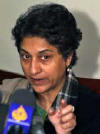|
The question of
cult groups and |
 Excerpt
of the report "Mission to France" (18-29 September 2005) submitted by Asma
Jahangir, U.N. Special Rapporteur on Freedom of Religion and Belief
Excerpt
of the report "Mission to France" (18-29 September 2005) submitted by Asma
Jahangir, U.N. Special Rapporteur on Freedom of Religion and Belief
107. The Special Rapporteur understands the legitimate
concerns regarding the victims of criminal acts that have been committed by
certain religious groups or communities of belief. She considers that, in many
cases, the Government of France, and its judicial
apparatus, have adopted a responsible attitude and provided an appropriate
response to the offences committed.
108. However, she is of the opinion that the policy and measures that have
been adopted by the French authorities have provoked situations where the
right to freedom of religion or belief of members of these groups has been
unduly limited. Moreover, the public condemnation of some of these groups, as
well as the stigmatization of their members, has led to certain forms of
discrimination, in particular vis-à-vis their children.
109. The Special Rapporteur has observed that the government policy may have
contributed to a climate of general suspicion and intolerance towards those
communities on the list created by the National Assembly in 1996, of movements
and groups classified as sectes. Moreover, the campaigns and other actions
that have been initiated by associations composed, inter alia, of victims of
criminal acts committed by these groups, have often been emotional.
110. The Special Rapporteur notes that in recent times the French authorities
have adopted a more balanced approach to this phenomenon by adjusting their
policy, including through the transformation of the Inter-ministerial Mission
to Combat “Sectes” (MILS) into the Inter-ministerial Mission to monitor and
combat abuse by sects (MIVILUDES). A number of improvements nevertheless
remain to be carried out in order to ensure that the right to freedom of
religion or belief of all individuals is guaranteed, and to avoid the
stigmatization of members of certain religious groups or communities of
belief, including those whose members have never committed any criminal
offence under French law.
111. The Special Rapporteur hopes that future actions of MIVILUDES will be in
line with the right to freedom of religion or belief and avoid past mistakes.
She will continue to closely monitor the various efforts that are carried out
by MIVILUDES.
112. The Special Rapporteur urges the Government to ensure that its mechanisms
for dealing with these religious groups or communities of belief deliver a
message based on tolerance, freedom of religion or belief and on the principle
that no one can be judged for his actions other than through the appropriate
judicial channels.
113. Moreover, she recommends that the Government monitor more closely
preventive actions and campaigns that are conducted throughout the country by
private initiatives or Government-sponsored organizations, in particular
within the school system in order to avoid children of members of these groups
being negatively affected.
114. She urges judicial and conflict resolution mechanisms to no longer refer
to, or use, the list published by Parliament in 1996.